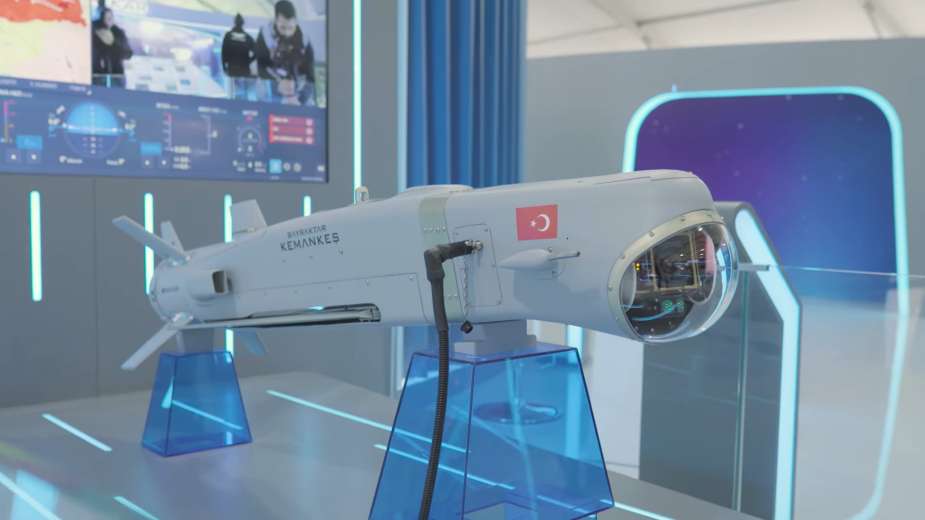Breaking news
Pakistan enhances UAV arsenal with Baykar AI-powered Kemankes missiles.
According to a tweet from Air Operations Syndicate on August 4, 2023, the Pakistan Air Force (PAF) unveiled its procurement of the Kemankes loitering munition from Türkiye's defense company Baykar. The Kemankes missiles are planned to be paired with Pakistan's existing fleet of Bayraktar TB2 drones, procured in 2021.
Follow Air Recognition on Google News at this link
 Pakistan enhances UAV arsenal with Baykar AI-powered Kemankes missiles (Picture source: Baykar Technologies)
Pakistan enhances UAV arsenal with Baykar AI-powered Kemankes missiles (Picture source: Baykar Technologies)
The Pakistan Air Force also operates Akinci and Anka UAVs, and the Kemankes missile can be launched from these three drones, all manufactured by Bayraktar. This suggests that the acquisition and integration of standoff weapons on UCAVs indicate PAF's intent to use them beyond traditional counterterrorism missions.
These advanced missiles are designed to integrate with unmanned aerial vehicles (UAVs), aligning with Pakistan's growing interest in UAV technology. Pakistan currently operates these three models of Turkish UAVs, and the relationship between the two countries was solidified in 2021 when NESCOM, a Pakistani company, signed an agreement with Türkiye's TAI for local production of Turkish Anka UAVs.
A notable feature of the Kemankes cruise missile is its incorporation of artificial intelligence (AI). This integration enables the missile to autonomously identify and select targets, even under adverse weather conditions, enhancing accuracy and adaptability.
The missile's dimensions are 1.73 meters in length, 0.4 meters in height, and a wingspan of 1.25 meters. It weighs a maximum of 30 kilograms, including a 6-kilogram warhead. The missile's optical guidance system includes a 2-axis stabilized camera with 36x magnification and a laser rangefinder capable of reaching 2.8 kilometers.
Powered by an IL170 turbojet motor, the Kemankes missile can cruise at a speed of Mach 0.7 and has an operational range of over 200 kilometers.
The Kemankes cruise missile was publicly unveiled for the first time in the spring of 2023, indicating advancements in Pakistan's defense capabilities and engagement with modern defense technologies. This development is being closely observed by neighboring countries, especially India.
The relationship between India and Pakistan has been marked by a history of conflict and tension since their partition in 1947. The conflict originated from the division of British India into a Hindu-majority India and a Muslim-majority Pakistan. The partition led to disputes over the territory of Jammu and Kashmir, which eventually joined India after the Maharaja sought assistance against Pakistani forces. This resulted in the first Indo-Pakistani War in 1947-48. Subsequent years witnessed intermittent wars, skirmishes, and diplomatic efforts to manage the complex relationship.
Both nations developed nuclear weapons, escalating the stakes of any confrontation and adding to regional concerns. Attempts at peace, like the 1972 Simla Agreement that established the Line of Control (LOC) in Kashmir, were punctuated by recurring violence and territorial disputes. The situation escalated due to the rise of militant movements and cross-border tensions, leading to conflicts such as the Kargil War in 1999.
Efforts for peace in the 21st century have been sporadic. Periods of optimism have alternated with instances of violence and diplomatic breakdowns. Various militant attacks, such as the 2016 Uri attack and the 2019 Pulwama attack, strained relations. Despite occasional agreements, border skirmishes, militant activities, and cross-border firings have persisted, resulting in ongoing instability in the region. India's decision to revoke Article 370 in 2019, which granted special status to Jammu and Kashmir, added to the tensions.
Recent developments underscore continued violence in Kashmir, concerns about terrorist activities, and internal political challenges within Pakistan. These factors contribute to an atmosphere of uncertainty and strained relations. Additionally, China's involvement in territorial disputes with India, particularly along the border, has added complexity, potentially leading to broader conflicts.


























